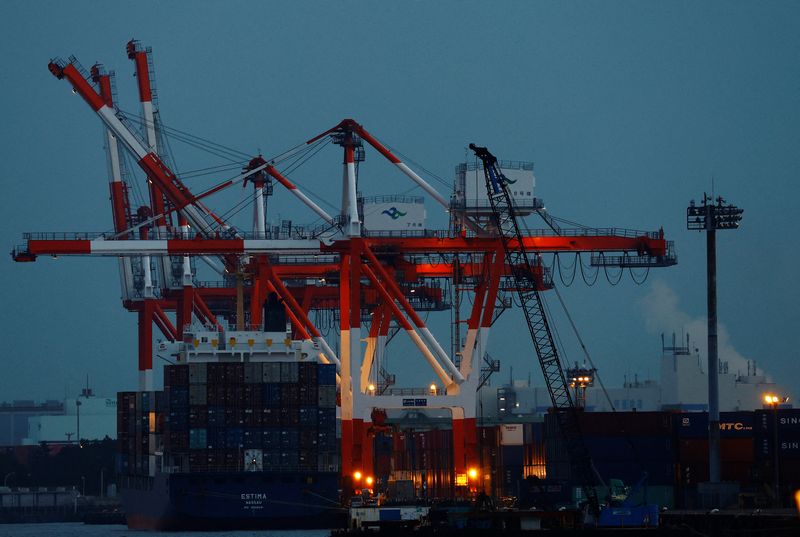By Daniel Leussink and Kantaro Komiya
TOKYO (Reuters) -Japan ran its biggest trade deficit in a single month in eight years in January as high energy costs swelled imports and manufacturers struggled with global supply constraints, causing a decline in car shipments.
The growing trade deficit highlights the world's third-largest economy's vulnerability to soaring commodity costs and slowing demand from giant neighbour China as the economy there struggles to maintain momentum.
Imports soared 39.6% year-on-year in January to hit a record high in terms of their value in yen, coming to 8.5231 trillion yen ($73.81 billion), Ministry of Finance data showed on Thursday, above a median market forecast for a 37.1% increase.
That greatly outstripped a 9.6% rise in exports in the year to January, bringing the trade balance to a deficit of 2.1911 trillion yen, its biggest in a single month since January 2014.
The deficit was much bigger than the median estimate for a 1.607 trillion yen shortfall.
"Exports tend to go down in January due to seasonal factors as factory operation rates are usually low due to New Year holidays," said Takumi Tsunoda, senior economist at Shinkin Central Bank Research Institute.
"So it's easy for the trade balance to go in the red in the month, but the deficit was still large, even when taking that into account."
A big factor in the deficit was a decline in car exports, said Tsunoda, which swung into contraction from an expansion in the previous month.
Manufacturers including Toyota Motor (NYSE:TM) Corp and Suzuki Motor Corp have been forced to temporarily close some plants after facing supply chain disruptions and pressure from a record surge in COVID-19 infections at home.
Imports were pushed up by surging incoming shipments of petroleum, coal and liquefied natural gas.
CHINA-BOUND EXPORTS FALL
By region, exports to China, Japan's largest trading partner, shrank 5.4% in the 12 months to January, posting its first contraction in 19 months, while imports jumped 23.7% to post their largest rise in four months.
That was likely in part due to slower exports and a front-loading of demand ahead of China's week-long Lunar New Year holiday that started on the last day of January.
A bigger cause of worry was the slowing momentum of China's massive economy, which is facing weakening consumption and a property downturn, some analysts said.
"China's economic slowdown could weaken exports going forward," said Ryosuke Katagi, market economist at Mizuho Securities.
U.S.-bound shipments, another key market for Japanese goods, grew 11.5% in January, as stronger machinery shipments outweighed a fall in car exports.
Separate government data showed core machinery orders, which serve as a leading indicator of capital spending in the coming six to nine months, were up 3.6% in December from the prior month, better than an expected 1.8% fall.
Manufacturers expected core orders to decline 1.1% in January-March, after a 6.5% gain in the previous quarter.
Japan's economy grew slightly less than expected in the final quarter of 2021 as falling coronavirus cases helped prop up consumption, government data showed on Tuesday, though a record surge in Omicron variant cases and the high raw material prices are clouding the outlook.
($1 = 115.4800 yen)
